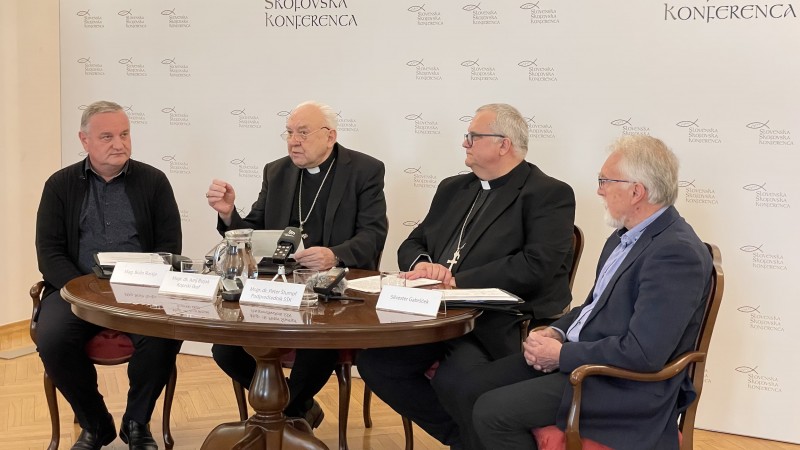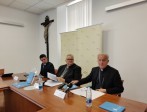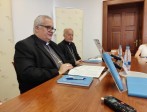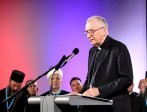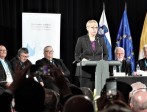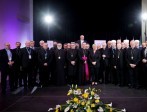“Zaradi svojih bratov in prijateljev bom vendar dejal: ‘Mir naj vlada v tebi.’ ” (Ps 122,8)
Evropo že več kot stoletje pestijo grozljive ideologije in konflikti, ki imajo hude posledice za celotno prebivalstvo. Lahko bi upali in si mislili, da se bomo iz tega naučili kaj dobrega za vse. Na žalost se to ni zgodilo, to dobro vemo.
Od začetka tega stoletja je naša celina Evropa znova v številnih preizkušnjah: vojna, krize na raznih področjih, splošna odtujenost med ljudmi, ki povzroča pomanjkanje upanja za prihodnost. Optimistične napovedi evropskega in svetovnega povezovanja, ki temeljijo na zahodnem sekularnem razumevanju človeka in družbe, so se izkazale za omejene. Opazimo lahko, da so bili podani le politični in gospodarski predlogi, pri čemer so bili prezrti ali izpuščeni veliki deli človeške opredelitve, ki so konstitutivni za identiteto in bivanje. Zdi se, da smo vstopili v obdobje, ki je vse bolj zunaj nadzora sodobnikov; iskanje rešitev za izboljšanje razmer otežujeta občutek nemoči na eni strani ter kulturna in vrednostna razdrobljenost na drugi, brez pripravljenosti na dialog, ki ne bi bil zgolj diplomatski, temveč tudi iskreno biten.
Kljub težavam in tragedijam vsakega zgodovinskega obdobja obstajajo priložnosti in kraji na stičišču različnih kulturnih krogov, ki omogočajo srečanje in pogovor, zlasti med verskimi voditelji, ki so prvi poklicani, da pogledajo onkraj političnih in drugih prehodnih agend, hkrati pa ostanejo v stiku z boleznimi tega sveta. Eno takih prizorišč je država Slovenija, ki leži v “srcu Evrope”, med Alpami, Sredozemljem in Panonsko (Madžarsko) kotlino, ki lahko deluje kot most med slovanskim, germanskim in romanskim svetom.
To se na poseben način odraža v obmorskem mestu Koper/Capodistrija (gr. lustinopolis, lat. Caput Histriae, it. Capodistria) na Jadranskem morju, ki s svojim geografskim položajem in zgodovinskimi izkušnjami povezuje vzhodno in zahodno Sredozemlje ter s tem tudi vzhodno in zahodno vejo krščanstva in drugih verskih tradicij. V današnji Sloveniji so ohranjene dragocene sledi starodavnega krščanstva, ki segajo v leta pred prvim ekumenskim nicejskim koncilom (325). Po eni strani je bila vključena v Akvilejski patriarhat in povezana s skupnimi krščanskimi svetniki, kot so Viktorin, Hromatin, Hieronim in koprski škof Nazarij, po drugi strani pa so na njenih skrajnih zahodnih obalah stali bizantinski samostani, medtem ko je pozneje vzhodni del države spadal pod slovanski misijon, ki sta ga v 9. stoletju ustanovila brata Ciril in Metod. Tu so bili ustanovljeni številni srednjeveški samostani. Našo deželo sta zaznamovala val reformacije in katoliška prenova z obdobjem baroka, ki sta prinesla grenke sadove nasilja in blagodejne sadove začetkov literature. V 19. stoletju je blaženi škof Anton M. Slomšek okrepil vero in narodno kulturo pred tujimi pritiski. Dvajseto stoletje je prineslo preizkušnje in trpljenje v totalitarnih sistemih. V jugoslovanskem času in politično zaželeni mešanici prebivalstva je Slovenija počasi prihajala v neposreden stik z islamom. Danes kristjani v Sloveniji iščejo nove poti za ohranjanje vere in krščanske kulture sredi izzivov sekularizacije. Na podlagi opisane poti se slovenski prostor in krščanstvo tu kaže kot nekakšen povzetek celotne evropske izkušnje s svojimi svetlimi in temnimi platmi. Hkrati pa zagotavlja potrebno širino za razumevanje različnih stališč in duhovnih pogledov glede preteklosti, sedanjosti in prihodnosti.
V nestanovitnih okoliščinah, na katere vpliva želja po moči in bogastvu, je lahko vera v Boga, ki ne prelomi svojih obljub, opora za vztrajanje v dobrem na medosebnem, družbenem in duhovnem področju. Kristus v evangeliju poudarja potrebo po notranji drži vztrajnosti: “In zaradi mojega imena vas bodo vsi sovražili; kdor pa bo vztrajal do konca, ta bo rešen” (Mt 10,22). Zato se verskim voditeljem in vsem ljudem dobre volje odpira večna perspektiva, ki v minljivih zemeljskih okoliščinah in dobrinah prepoznava le sredstvo in ne cilj za polnost življenja tukaj in v prihodnjem življenju. Harmonični medosebni odnosi, uravnotežen družbeni razvoj in dialoško iskanje skupne resnice zahtevajo ponovno pozornost do eshatologije, s tem pa tudi do zavedanja o človeški krhkosti in Božji vsemogočnosti.
Zakoreninjenost v duhovnem izročilu daje kristjanom in pripadnikom drugih religij občutek smisla in odgovornosti, da si prizadevajo za celostno podobo človeške osebe, uravnotežen družbeni razvoj ter mir med ljudmi, državami in kulturami. Dialog, ki se goji na različnih ravneh, je najprimernejše sredstvo za to prizadevanje, začenši z dialogom med verskimi voditelji, katerih resnicoljubnost in vztrajnost pri dobri stvari bi morala biti zgled drugim voditeljem in ljudem dobre volje. Namen dialoga je spoznavanje vzajemnih stališč, izkušenj in čustev, kar po eni strani omogoča ponižno iskanje skupne resnice, hkrati pa vzpostavlja medsebojno zaupanje in preprečuje uničevanje tistega, kar je za drugega sveto, kot je poudarjeno že v tako imenovanem zlatem pravilu evangelija: “Tako torej vse, kar hočete, da bi ljudje storili vam, tudi vi storite njim” (Mt 7,12). V sedanjih razmerah, ki so še posebno značilne za evropsko celino in zlasti za Balkan, je potreba po dialogu še zlasti očitna na področju občutljivih vprašanj, ki se tičejo delovanja Krščanskih cerkva in drugih verskih skupnosti, tako v odnosu do njih samih kot v odnosu do družbe. Gre za dialog, ki spodbuja pozitivno vrednotenje verskega znanja in tradicij, zaščito neodtujljivih človekovih pravic in družinske celice, ki temelji na trajni zvezi moža in žene, spodbujanje verske svobode ter krepitev pravičnih medosebnih in družbenih odnosov, zlasti na področju trajnostne skrbi za naravne vire in uravnoteženega gospodarskega razvoja, ki naj v središče postavlja blaginjo človeka in skupnosti, ne pa podrejanje brezmejni rasti ali dobičku. Doseganje ekološke in gospodarske pravičnosti odločilno prispeva k (preventivnemu) prizadevanju za mir, da bi se izognili še večjemu nezaupanju in konfliktom, med katerimi je nedavni primer tragedija trajajoče vojne na vzhodnih mejah Evrope, medtem ko se stari konflikti na Zahodnem Balkanu ponovno odpirajo v novih in vse nevarnejših okoliščinah.
Glede na doslej napisano so območja slovanskih mej in Zahodnega Balkana za verske voditelje še posebno skrb vzbujajoča. Tu je zelo potreben poziv predstavnikom političnih in vojaških oblasti, naj nemudoma prekinejo sovražnosti, se usedejo za pogajalsko mizo ter si z vso odgovornostjo prizadevajo ublažiti vzroke in posledice vojne, ki uničuje človeška življenja, spodkopava že tako razrahljane mednarodne odnose, kar lahko privede do še hujšega konflikta svetovnih razsežnosti, ter krepi sovraštvo med geografsko, zgodovinsko in duhovno bližnjimi narodi. Verske skupnosti, ki temeljijo na eshatološkem pogledu na stvarnost, zavezanosti dialogu in zagotavljanju humanitarne pomoči vsem prizadetim brez razlike, se zavedajo zapletenosti sedanjih razmer in poudarjajo svojo željo po neodvisnosti od političnih in drugih zemeljskih koristi. V tem okviru ter v primeru Ukrajine in Zahodnega Balkana priznavajo pravico vseh verskih skupnosti do obstoja in pozivajo državne oblasti, naj v interesu miru in dialoga spoštujejo njihovo svobodo. Od tod izhaja velik pomen rednih srečanj in iskanja skupnih rešitev med različnimi verskimi skupnostmi in znotraj samih verskih skupnosti, kjer imajo Katoliška cerkev, Pravoslavna cerkev in Islamska skupnost zaradi svojega zgodovinskega in sedanjega vpliva ter števila posebno odgovornost. Obe Krščanski cerkvi, pa tudi Cerkve, ki so izšle iz reformacije, že šestdeset let sodelujejo v ekumenskem dialogu in pomagajo rušiti stoletne zidove odtujenosti, predsodkov in sovraštva. Na Balkanu je ekumensko gibanje še posebno v službi razumevanja in miru med narodi, ki jih globoko ločuje vera. Pri tem nas navdihujejo izkušnje treh evropskih ekumenskih svetov (Basel 1989, Gradec 1997, Sibiu 2007), ki so poudarili odgovornost vseh kristjanov za pravičnost, mir, spravo in varovanje stvarstva. V njih so med drugim dejavno sodelovali tudi kristjani z Balkana. Čutimo se zavezane načelom Ekumenske listine (2001), ki je bila sad teh srečanj. Kristjani smo se v obeh svetovnih in balkanskih vojnah borili na nasprotnih straneh, drug proti drugemu, zato vidimo vojno kot največje zlo.
Katoliški škofje v Sloveniji verjamemo v bratstvo in družbeno prijateljstvo, pri čemer se seveda sklicujemo na tretjo encikliko papeža Frančiška: Fratelli tutti. Dobro vemo, da je eno od besedil, ki so njena podlaga, Dokument o človeškem bratstvu za svetovni mir in skupno sobivanje, ki ga je papež Frančišek podpisal skupaj z velikim imamom Ahmadom Al-Tayebom 4. februarja 2019 v Abu Dabiju. Načela sočutja in človeške solidarnosti, zapisana v tem besedilu, so ista, ki so pozneje navdihnila resolucijo, s katero je bil 4. februar razglašen za mednarodni dan človeškega bratstva, kot je ob več priložnostih izjavil generalni sekretar Združenih narodov António Guterres, in odločitev, da se v Abu Dabiju, središču Združenih arabskih emiratov, zgradi Hiša abrahamske družine, velikansko medversko središče, ki so ga odprli 15. februarja in je posvečeno trem monoteističnim religijam: sinagoga Moise Ben Maimon, cerkev svetega Frančiška Asiškega in mošeja Iman al-Tayeb. Vse tri stavbe so enako velike in visoke ter vsaka predstavlja arhitekturne kode treh kultur, ki v Abrahamu vidijo svojega očeta. Pri prizadevanju za mir se želimo pridružiti tudi pripadnikom judovske in muslimanske vere ter vsem vernicam in vernikom in nevernikom, ki mir razglašajo za svojo osrednjo vrednoto (hebrejsko: šalom, arabsko: salam). K temu nas zavezujejo Jezusove besede: “Blagor tistim, ki delajo za mir, kajti imenovani bodo Božji sinovi” (Mt 5,9).
Prav v tem duhu in ker je svet - vključno z državami - le skupina družin, ki živijo blizu druga drugi, upoštevajoč tudi sedanje boleče konfliktne razmere med bratskimi državami in napetosti na Balkanu, iščoč harmonijo v dialogu in v sodelovanju z lokalnimi verskimi voditelji in prijatelji dobre volje, da bi dosegli mir v regiji, zlasti na Balkanu, je Slovenska škofovska konferenca predlagala forum: plah, a pomemben in zahteven poskus v sedanjih razmerah.
Iskrenega srečanja in rodovitnega dialoga ni brez molitve in zaupanja v Stvarnika, ki je vladar zgodovine in dokonča, česar človek sam ne more storiti. Le okrepljena vera v Boga in iskrena ocena lastnih preteklih dejanj, ki jih zaznamuje človeška nemoč, pomagata na poti dialoga doseči mir na medosebnem, družbenem in duhovnem področju.
Koper, 21. marec 2023
Odbor za pripravo Foruma
Forum for Dialogue and Peace in the Balkans
Balkan Summit of Leaders of Christian Churches and Other Religions
Koper/Capodistria (Slovenia), 17th June 2023
Declaration
“For my brethren and companions’ sakes, I will now say, “Peace be within thee.” (Ps 122: 8)
For more than a century now, Europe has been plagued by major terrible ideologies and conflicts with serious consequences for entire populations. One could hope and think that lessons would be drawn for everyone's goodness. Unfortunately, this was not the case, we know that well.
Since the beginning of this century, our continent, Europe, is immersed again in a series of trials: war, crises in various fields, a general alienation between people conducting to a lack of hope for the future. Optimistic predictions of European and global integration based on a Western secular understanding of human being and society have proved to have its limits. It can be noted that only political and economic proposals have been made in ignorance or omission of large parts of human definition that are constitutive of identity and being. We seem to have entered an era that is increasingly beyond the control of his contemporaries; the search for solutions to remedy the situation is made more difficult by a sense of powerlessness on the one hand, and by a cultural and value fragmentation on the other, without a willingness to engage in a dialogue that is not merely diplomatic but also sincerely substantive.
Despite the difficulties and tragedies of every historical period, there are opportunities and places at the crossroads of different cultural circles that make it possible to meet and talk, especially among religious leaders, who are the first to be called to look beyond political and other transient agendas, while at the same time keeping in touch with the ills of this world. One such venue is the country of Slovenia, located in the “heart of Europe”, between the Alps, Mediterranean, and Pannonian (Hungarian) Basin, which can act as a bridge between the Slavic, Germanic and Romance worlds.
This is reflected in a special way by the coastal city of Koper/Capodistria (Gr. lustinopolis, Lat. Caput Histriae, It. Capodistrid) on the Adriatic Sea, which, by its geographical position and historical experience, links the eastern and western Mediterranean, and thus also the eastern and western branches of Christianity and other religious traditions. Today’s Slovenia is home to precious traces of the ancient Christianity, dating back to the years before the first Ecumenical Council of Nicaea (325). On the one hand, it was incorporated into the Patriarchate of Aquileia and associated with common Christian saints such as Victorinus, Chromatins, Jerome and Bishop Nazarius of Koper; on the other hand, its westernmost shores were home to Byzantine monasteries, while later the eastern part of the country fell under the Slavic mission founded in the 9th century by the brothers Cyril and Methodius. Many medieval monasteries were founded here. Our country was marked by the wave of the Reformation and the Catholic renewal with its Baroque period, both of which brought the bitter fruits of violence and the beneficial fruits of the beginnings of literature. In the 19th century, the blessed Bishop Anton M. Slomsek strengthened the faith and national culture against foreign pressures. The twentieth century brought trials and suffering under totalitarian systems. In the Yugoslav time and its politically desired mix of populations, Slovenia came slowly in direct contact with Islam. Today Christians in Slovenia are seeking new ways to preserve faith and Christian culture amid the challenges of secularisation. Based on the path described above, the Slovenian space and Christianity here emerges as a kind of summary of the European experience as a whole, with its bright and dark sides. At the same time, it provides the necessary breadth for understanding the different attitudinal and spiritual views concerning the past, the present and the future
In volatile circumstances, influenced by the desire for power and wealth, faith in a God who does not break his promises can be a support for persevering in the good in the interpersonal, social and spiritual spheres. In the Gospel, Christ stresses the need for an inner attitude of perseverance: “All men will hate yon for my name’s sake, but whoever endures to the end will be saved” (Mt 10:22). Hence, for religious leaders and all people of good will, an eternal perspective opens, which recognizes in fleeting earthly circumstances and goods only a means, not an end, to the fullness of life here and in the life to come. Harmonious interpersonal relationships, balanced social development and the dialogical search for common truth call for a renewed attention to eschatology, and thus also to an awareness of human frailty and God’s omnipotence.
Being rooted in a spiritual tradition gives Christians and members of other religions a sense of purpose and responsibility to strive for a holistic image of the human person, balanced social development and peace among peoples, countries and cultures. Dialogue, cultivated at various levels, is the preferred means for this endeavor, beginning with dialogue among religious leaders, whose truthfulness and perseverance in the good cause should serve as an example to other leaders and people of good will. The purpose of dialogue is to learn about each other’s views, experiences and feelings, which, on the one hand, makes possible a humble search for common truth, while at the same time establishing mutual trust and preventing the destruction of what is sacred to the other, as already pointed out by the so-called golden rule of the Gospel: “So whatever you would that men should do to you, do also to them” (Mt 7:12). In the present situation, which is particularly characteristic of the European continent and especially in the Balkans, the need for dialogue is particularly evident in the area of sensitive issues concerning the action of Christian Churches and other religious communities, both in relation to themselves and in relation to society. It is a dialogue that promotes a positive appreciation of religious knowledge and traditions, the protection of inalienable human rights and the family unit based on the permanent union of husband and wife, the promotion of religious freedom, and the strengthening of just interpersonal and social relations, particularly in the areas of sustainable care for natural resources and balanced economic development, which should place the welfare of the person and of the community at its center, rather than subordination to limitless growth or profit. Achieving ecological and economic justice makes a decisive contribution to (preventive) work for peace to avoiding deeper distrust and conflict, among which the tragedy of the ongoing war on the oriental borders of Europe has been a recent example, while old conflicts in the Western Balkans are being reopened in new and increasingly dangerous circumstances.
In the light of what has been written so far, the areas of the Slavic boarders and the Western Balkans are of particular concern to religious leaders. Here, there is a much-needed call for the representatives of political and military authorities to immediately cease hostilities, to come to the negotiating table, and to try with all responsibility to mitigate the causes and consequences of a war that is destroying human lives, undermining already frayed international relations, which could lead to an even more serious conflict of global proportions, and reinforcing the hatred between geographically, historically and spiritually close peoples. Religious communities, based on an eschatological view of reality, a commitment to dialogue and the provision of humanitarian aid to all those affected indiscriminately, are aware of the complexity of the current situation, underlining their desire to be independent of political and other earthly gains. In this context, and in the case of Ukraine and the Western Balkans, they recognize the right of all religious communities to exist and call on the State authorities to respect their freedom in the interests of peace and dialogue. Hence the great importance of regular meetings and the search for common solutions between the various religious communities and within the religious communities themselves, where the Catholic Church, the Orthodox Church and the Islamic community have a particular responsibility, given their historical and current influence and numbers. Both these Christian Churches, as well as the Churches that emerged from the Reformation, have been engaged in ecumenical dialogue for the last sixty years, helping to break down centuries-old walls of alienation, prejudice and hatred. In the Balkans, the ecumenical movement is particularly at the service of understanding and peace between peoples who are deeply divided by religion. In this we are inspired by the experience of the three European Ecumenical Councils (Basel 1989, Graz 1997, Sibiu 2007), which underlined the responsibility of all Christians for justice, peace, reconciliation and the safeguarding of creation. Christians from the Balkans, among others, actively participated in them. We feel committed to the principles of the Ecumenical Charter (2001), which was the fruit of these gatherings. Christians fought on opposite sides, against each other, in the two world wars and in the Balkan wars, which is why we see war as the greatest evil.
We, Catholic Bishops in Slovenia, believe in fraternity and social friendship, naturally referring to Pope Francis' third encyclical: Fratelli tutti. We know well that one of the texts that form its basis is the Document on Human Fraternity for World Peace and Living Together, which was signed by Pope Francis together with the Grand Imam Ahmad Al-Tayeb, in Abu Dhabi, on February 4, 2019. The principles of compassion and human solidarity enshrined in this text are the same ones that later inspired the resolution that established February 4 as the International Day of Human Fraternity, as stated on several occasions by the Secretary-General of the United Nations, António Guterres., and the decision to build in Abu Dhabi, the hub of the United Arab Emirates, the Abrahamic Family House, a gigantic interreligious center inaugurated the past 15th February and dedicated to the three monotheistic religions: the Moise Ben Maimon synagogue, the church of St. Francis of Assisi and the Iman al-Tayeb mosque. The three buildings are of equal size and height and each represents the architectural codes of the three cultures that see in Abraham their father. In working for peace, we also want to join with those of the Jewish and Muslim faiths, and all women and men believers or not believers who proclaim peace as their central value (Hebrew: shalom, Arabic: salam). We are bound to do so by the words of Jesus: “Blessed are those who work for peace, for they shall be called sons of God” (Mt 5:9).
It is rightly in this spirit and because the world -including States- is but a group of families living close to each other, taking also into account the current painful conflict situation between brother countries and tensions in the Balkans, seeking harmony in dialogue and collaborating with the Regional Religious Leaders and friends of good will, to achieve peace in the region, especially in the Balkans, that the Slovenian Bishops' Conference proposed the Forum: a timid but important and challenging attempt in the current circumstances.
There can be no sincere encounter and fruitful dialogue without prayer and trust in the Creator, who is the Ruler of history and completes what human being alone cannot do. Only a strengthened faith in God and a sincere assessment of one’s own past actions, which are marked by human helplessness, help to achieve peace in the interpersonal, social, and spiritual spheres, using the dialogue way.
Koper, 21st March 2023

